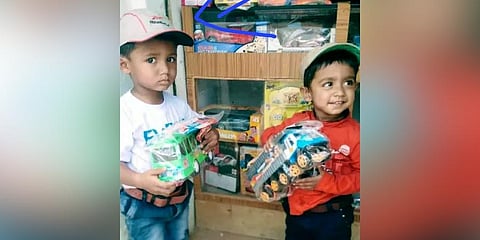

HYDERABAD: Some of us are using our precious outings during the COVID-19 lockdown to buy groceries, and many to buy liquor. Ayatullah Malike, a Rohingya Muslim living at Balapur, however, has to step out to get something vital for his children - blood. Ahead of World Thalassemia Day on May 8, we talk to a father about his struggles in this lockdown.
Two of his children, Usma Malike (8) and Abdul Rasool (3), were born with thalassemia. They need blood every 21 days and the lockdown has made procuring blood a struggle for him. The cards issued by Center for Thalassemia and Blood Disorders in Banjara Hills to his children have helped him escape the scrutiny of police, and also get free blood transfusion from Aarohi Blood Bank, but recently, he had to take matters in his own hands.
"After the second lockdown was extended, there was a scarcity of blood in the bank. Any delay in transfusion puts my children’s lives at risk. I am unemployed and I cannot afford to buy blood. That is why, I had to ask a Rohingya friend of mine to donate blood. My son received the transfusion after that. However, his haemoglobin count is stuck at 6, and I am worried."
Even if the children get blood transfusion for free, Ayatullah has to arrange for medicines, which can cost up to Rs 5,500 a month. "The lockdown has made it difficult for me to find work. Following an appendicitis surgery, I cannot work in any field which requires lifting of heavy weights. Perhaps, I can work as a security guard?" he wonders.
The lockdown has brought about more woes for this father of four, who came to Hyderabad from Delhi three years ago. "Earlier, I was receiving a financial assistance of Rs 8,000 for my daughter from United Nations High Commissioner for Refugees (UNHCR), but due to the pandemic, that has been halted. I am yet to receive any assistance from them for my son. I was optimistic that I could find a job after the lockdown ends. However, the recent extension has nipped my plans in the bud."
Fleeing persecution, Ayatullah came to India from Rakhine in Myanmar in 2012.
(The author can be contacted at kakoli_mukherjee@newindianexpress.com)
Twitter: @KakoliMukherje2